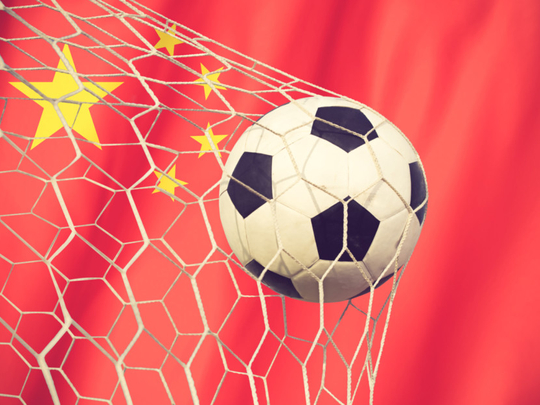
They may lack Barcelona or Chelsea’s glamour, but Chinese football clubs are luring skilful South Americans with irresistible multimillion-dollar cheques in their quest to make China a world soccer power.
While Argentina’s Lionel Messi or Brazil’s Neymar bathe in glory as well as cash at Barcelona, a lower-profile Latin legion is hearing the call of the east, where big-money transfers offer precious economic security for players from poor families.
“As professionals we have to see it as a work opportunity. We have short careers. We have to think of the economic stability of our families,” said Colombian midfielder Mauricio Molina, who played for six years in South Korea.
Luis Paulo Rosenberg, an economist and former vice-chairman of Brazilian club Corinthians, sees such players as “purely economic actors”.
“As long as they are receiving those millions, it doesn’t matter to them whether China has good or bad football,” he said.
Unlike US teams who have scooped up European stars nearing retirement such as England’s David Beckham and Steven Gerrard, Asian sides want top players with their best years ahead of them.
Clubs in China in particular are paying huge sums to get them, matching the level of major transfers in Europe — but focusing on Latin America, where such riches are a distant dream.
Brazilian midfielder Ramires recently transferred from Chelsea to Jiangsu Suning in China for $31 million and scored on his debut.
His countryman Alex Teixeira, 26, has just joined him at the Chinese club, which outbid Liverpool to sign him from Shakhtar Donetsk for $56 million.
Colombian striker Jackson Martinez, 29, moved in early February from Atletico Madrid to Guangzhou Evergrande for around $46 million.
“They are taking South American players because we have different skills from Asian ones,” Molina said.
Football cash ‘bubble’?
China’s Super League has no fewer than 26 Brazilian players — its biggest foreign contingent. Twelve more Brazilians play in China’s second division, according to tracking website Transfermarkt.
Brazilian media have calculated that 134 Brazilian players played in China between 2003 and 2010.
“A Brazilian player does not start out on his footballing career aiming to play for the national side or sign for Barcelona,” said Rosenberg.
“He starts out to solve the economic problems stemming from his humble background. Most of them have many relatives and friends to support and they look to maximize their returns.”
The trend for buying up players has raised scepticism as well as excitement.
“China bursting onto the scene is harmful for Brazilian football because it is inflating the market without much guarantee of consistency,” said Ary Rocco, a sports marketing expert at Sao Paulo University.
“We do not know how long this investment will last. It seems to be driven by a temporary bubble.”
Chinese ‘sporting power’
In the days when such transfers were still rare, Guangzhou Evergrande won its first top league title the year it signed Argentine midfielder Dario Conca in 2011.
In the current Chinese transfer window, Super League clubs have spent $314 million so far, according to Transfermarkt.
China lost all three of its matches in the only World Cup it played in, in 2002. It let in nine goals and scored none.
Now Chinese President Xi Jinping, a self-confessed football fan, has said his aim is for China to host and win a World Cup.
He wants to “turn China into a sporting power as part of the Chinese dream”.
“In China they wanted to make football grow and they wondered why they weren’t making progress,” said Sergio Garcia, a coach who used to run a football youth training school for Chinese players in his native Argentina.
“The problem was that a youth player could not start at 16, because he had to study in school all day. Now they have decided to teach football in the primary and secondary schools,” he said.
“But I think investing so much money is more for marketing than to make the sport grow.”




